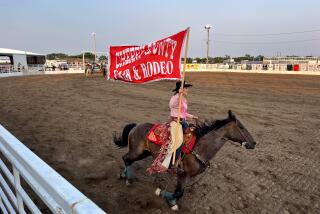Planes, Campaigns and Huge Logistical Pains
- Share via
OKLAHOMA CITY — Already running behind schedule, a perturbed Wesley K. Clark stood, legs apart, arms outstretched in a small charter airline office Monday as a private security agent ran a metal detector over the retired four-star general.
“This stuff takes forever,” the Democratic presidential hopeful grumbled. It didn’t take forever, but by the time his entourage was screened, 45 precious minutes had passed with less than 24 hours to go before today’s crucial balloting in seven states.
Clark arrived at his next event, in Albuquerque, late again.
The logistics of any national primary campaign are mind-bending, with advance teams scrambling to prepare everything from klieg lights to throat-lubricating beverages for hoarse candidates as they stump in six or eight cities across three or four states in a day.
This Democratic primary season, however, has been especially bedeviling, many longtime campaign workers say.
Heightened security measures in the post-9/11 world have slowed the charter plane-hopping candidates. A compressed schedule is forcing them to seek votes during today’s balloting in such far-flung states as North Dakota, South Carolina, Arizona and Missouri.
At the same time, ever-faster communications -- from hand-held e-mail devices to wireless laptop computer modems -- allow campaigns to shift plans and strategies with the click of a “send” key, inevitably with consequences.
“It’s easy to e-mail somebody and say, ‘OK, go to Oklahoma instead of South Carolina,’ ” said Clark senior strategist Chris Lehane, who receives about 1,000 e-mails a day on his hand-held device.
“But you still bump up against the cold, hard realities: Does the plane have enough fuel? Has the pilot had enough sleep? Do you have hotel rooms on the ground?”
Clark, whose late-starting campaign has perhaps run into more of those realities than the others, missed what was to be his first stop in South Carolina after the New Hampshire primary because, according to federal regulations, the pilot and crew had not had enough sleep. Such snafus can be costly. A hundred people were left waiting for Clark in Charleston.
Sen. John Edwards of North Carolina was delayed recently in Albuquerque because he, too, had to go through screening before boarding a charter plane, and had his pocketknife confiscated. By the time he arrived in Oklahoma, some in the crowd had headed home.
New screening regulations for charter flights are among the most campaign-confounding differences between this primary and that of 2000.
In 2003, the Transportation Security Administration mandated that people flying on private charter planes with 61 seats or more, or a takeoff weight of at least 100,000 pounds, be screened much the same as passengers flying on commercial jetliners.
In the early days of the primary season, candidates did not need such large aircraft. As the top contenders have taken on staff and reporters -- some 100 journalists traveled with Sen. John F. Kerry one recent day -- the rule has caused several candidates to arrive tardy at events.
The Dean campaign uses two planes that are smaller than those that trigger TSA screening.
To add to the headaches of clock-watching advance teams, many small airports where the charter planes land lack X-ray machines and other screening devices, so every suitcase, computer bag and pocket is searched by hand.
“This is the first time the new rules have intersected with a presidential campaign, and everyone’s trying to cope -- the candidates, the charter companies and the TSA,” said one longtime charter company executive, who has worked with many campaigns and asked not to be identified. “Right now it’s a mess.”
In an effort to choose a nominee sooner -- and thus give him more time to raise money to compete with President Bush in the general election -- the Democratic National Committee crunched the schedule for this year’s primary contests, meaning candidates would have to campaign in more places more quickly.
Today’s contests were further complicated when Missouri Rep. Dick Gephardt dropped out of the race, opening up the state with the most delegates -- 74 -- to former rivals.
Some campaigns swiftly wrote Missouri off, in part because traveling to yet another region of the country would simply be too difficult.
“On a normal campaign you have three or four days of lead time,” said one veteran advance man. “This season, it’s often 12 or 24 hours.”
The snafus stacked up one recent day for the Clark campaign, and by its end, things did look a bit unkempt.
Running two hours behind schedule, Clark hired a small plane to whisk him to a rally in Albuquerque and left his staff and the reporters who travel with him to take another plane.
The campaign had neglected to list the staffers on the plane’s manifest, however, and after failed negotiations, they were unceremoniously kicked off.
By the time all the logistical wrinkles were ironed out, the rally was over.
It was never reported in the national media because the national media never made it.
*
Times staff writers Matea Gold and Scott Martelle contributed to this report.
More to Read
Get the L.A. Times Politics newsletter
Deeply reported insights into legislation, politics and policy from Sacramento, Washington and beyond. In your inbox twice per week.
You may occasionally receive promotional content from the Los Angeles Times.










